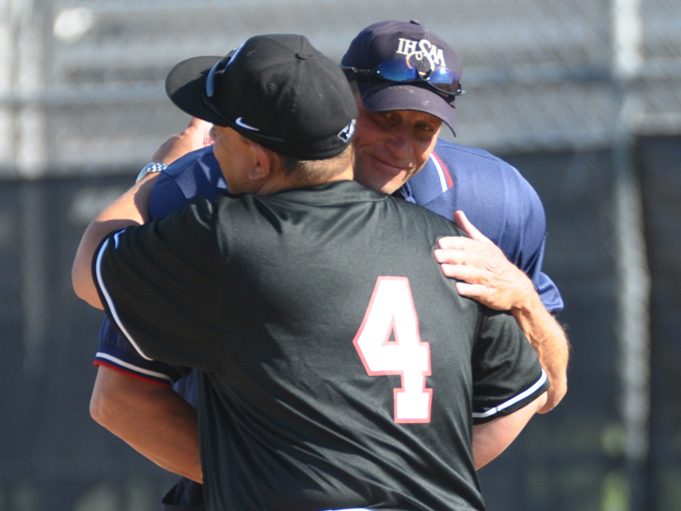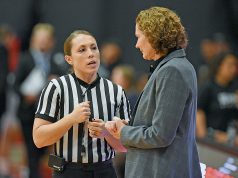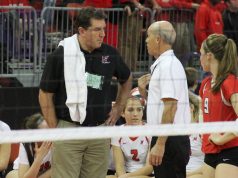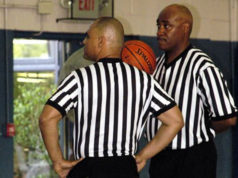I was working a boys’ basketball game a few years back and the home team was getting shelled. They couldn’t shoot, pass, handle the ball or defend. By the third quarter, the margin was 30 points and I was standing in front of their coach, with whom I had a decent relationship.
“I’m telling you, Sloan — you mark my words: Next game, I’m only dressing seven players,” he promised.
“Really?” I responded, beginning a scan of the floor to pick out who he might have in mind.
“Yep. The rest will just have to start dressing themselves from now on.”
Now, that was a fellow who I’d seen chew up and spit out officials in the past. I’m not suggesting I have some kind of gift with coaches. There are others who snoot me out and seem to be buddies with some of my confreres. I often think about why that is and how to have more successful relationships with coaches. And in some places, like in Iowa, there’s more to gain from understanding because it’s a “recommendation” state: Coaches name officials whom they would like to see reffing playoff games. They aren’t asked why, only who. There are some officials who gel with some coaches and, statistically, the ones who get along get further ahead. What’s their secret?
Recently I asked a former coach, who is an assigner, to sum up what related refereeing to recommendations. He said it came down to general personality — a sense for the coaches and officials being in it together — and consistency of calls. That’s a short list, but the Holy Grail to most. We all strive for consistency, but the esprit de corps thing surprised me. How can we be in it together when our job is to do what’s best for the game and the coaches’ is to do what’s best for the team?
It’s all about relationships, and how you get by with coaches is a big part of that. I’m not saying graduating, cum laude, from Referee Charm School is a prerequisite for success; officials who overtly pander to coaches seldom get far. But learning how to empathize is important. When you understand how coaches think, it’s easier to know what annoys them or makes them comfortable with you. That’s all well and good. But it often contrasts with our style as officials: We call games a certain way and have standards, which mesh well with some coaches’ outlooks, but not others. With all that, there’s still a great middle ground, where accepting that there are some forces at work and then working proactively in response makes for more success as an official.
Let’s understand some basic things about coaches at the high school level. First, most are teachers. Next, few I’ve run into didn’t consider the job to be fulfillment of a significant ambition: They’re doing it because they want to and, with rare exceptions, were selected. Third, they work in school systems that pander to society’s demand for winners. Fourth, they are under demand to put time into their efforts to produce a competitive product against the resistance of family, profession, the limitations of players and their own stamina. Fifth (choose one), they either feel the love or the noose tightening.
Finally, every one of them handles the pressure of success or failure differently.
My wife just handed me a coffee as I was typing and remarked, “Hmm: So, getting along with coaches is just like being married. … Are you going to be able to cut the lawn today?”
She is right! Some marriages click: The spouses are so alike they naturally interact in a way that is smooth and largely non-confrontational. For others, it takes work and the pair learns what annoys/enamors the other. They decide that some issues are better overlooked. And then there are The Honeymooners, who disagree on everything. Few enter marriage because they look forward to a life of discord. More likely, they lack the skills to manage conflict.
By that rationale, many good relationships with coaches might be accidental. That is, we don’t all comprehend that many relationships take work to work. If a coach and official see the game-related things the same way, few bad things happen. So, where I tend to reward teams that have good skills and can avoid violations, coaches who emphasize the same get along with me. If they coach aggressive play in the paint while I jump post players who sit on each other’s laps, we have a problem. One of us has to give in if the relationship is to be smoother. That creates a crisis, where two facts apply: We need the coaches more than they need us. The two of us have conflicting pressures: The coach (hopefully) likes his or her job and has some need to behave, train and mentor. And I have a binder of memos from the state admonishing me to be alert to, and penalize, various behaviors. So, how do we do our jobs and have more effective relationships with coaches?
Accept that the majority will never see everything the same way you do: It shouldn’t be surprising that many coaches will carry on more than you think is acceptable. It’s not about you! Not everything sung to us in burps requires a response. The best officials keep the peace with coaches by reacting to the message and not the delivery until the delivery interrupts the game.
Accept that it helps to give a little when the conflict is insignificant: Sense when coaches are trying to be sensible about a bad situation and you need to tag along: Team A has travelled 41 times by halftime and appears unable to help it. Team B has driven 60 miles through the snow and is growing tired of rehearsing their inbound plays. It hopes to be home by midnight. Think about relaxing your standard a little and serving the teams. Work with the coaches to become part of a solution. Heresy, I know, but many coaches respect that over rigid consistency; in that regard, you can all be in it together.
Accept that your style needs to be flexible: Some crews develop reputations for being the threesome-of-choice for certain games: If the last meeting was contentious, send this crew because they’ll clean it up. For the rest of us, the game is what it is: It’s played by two teams with strengths and weaknesses and, if it makes for a fair game, let them set their tone. Take charge to avert conflict, not create it.
The best officials advance not by being the best rules people, the best athletes or the most committed, although those are important. They get there by being the most successful. They take each game as it comes and respond to what they see.
For more tips and techniques download Referee’s free Ultimate Guide to Managing Coaches, Players and Fans.
What's Your Call? Leave a Comment:
Note: This article is archival in nature. Rules, interpretations, mechanics, philosophies and other information may or may not be correct for the current year.
This article is the copyright of ©Referee Enterprises, Inc., and may not be republished in whole or in part online, in print or in any capacity without expressed written permission from Referee. The article is made available for educational use by individuals.

















